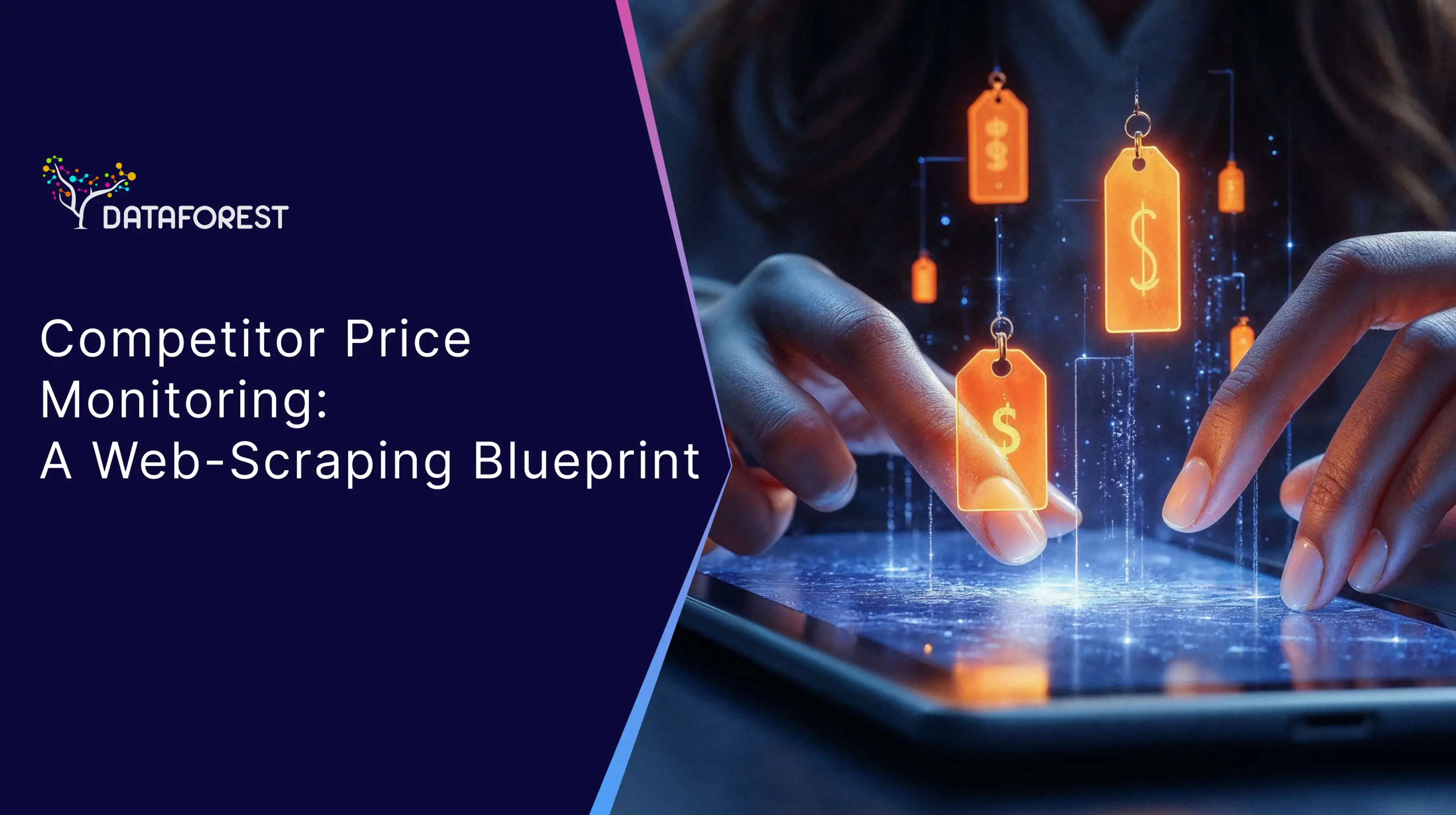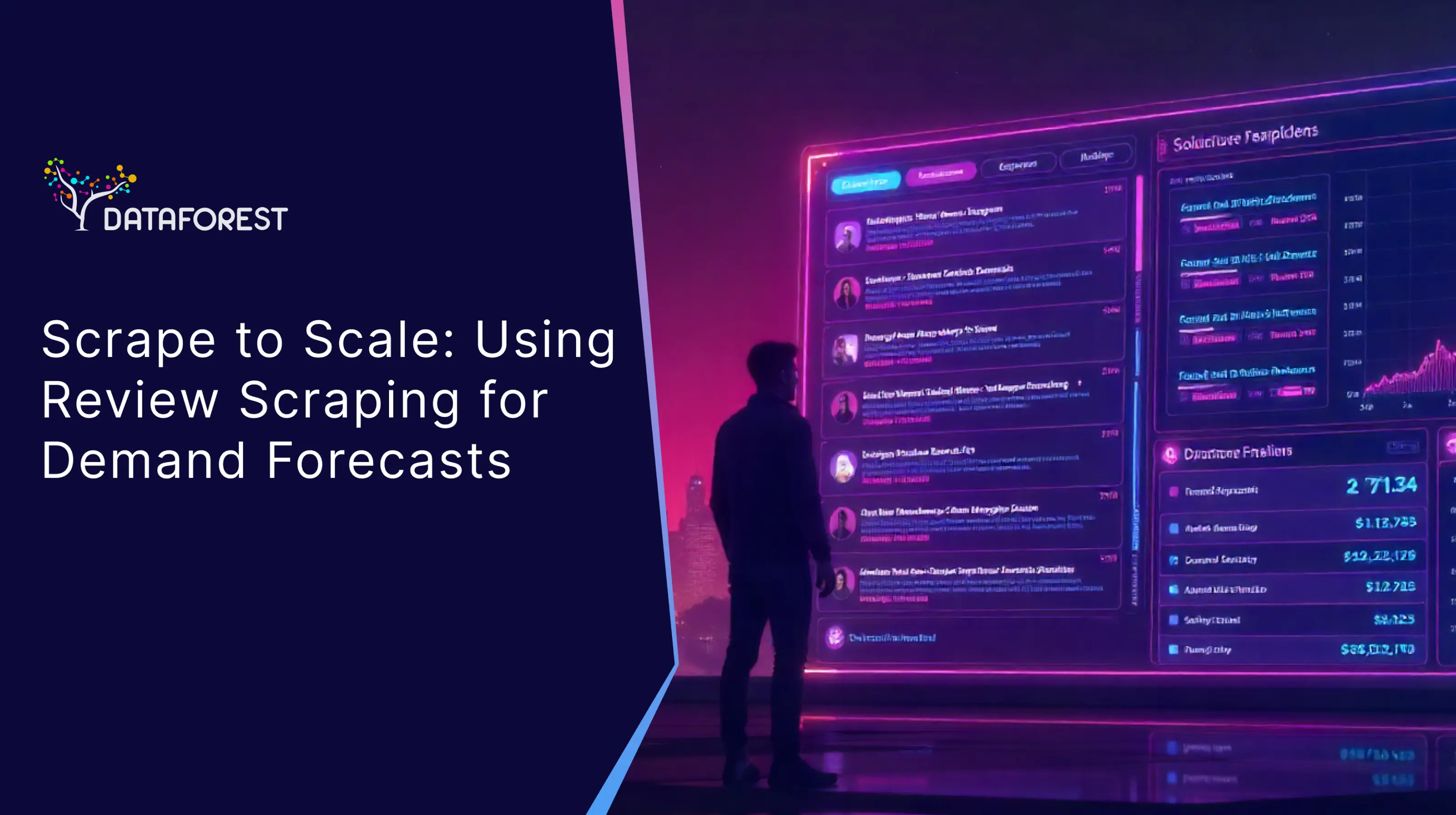
Lead Generation Solutions
DATAFOREST expertise enables our team to provide leading B2B lead generation solutions that automatically identify potential customers at scale, replacing expensive manual research with systematic data collection. We transform unstructured web data into sales leads through machine learning and filtering techniques.




PARTNER

PARTNER
FEATURED IN

01
Extract Leads
Automated web crawling scans websites, forums, and public databases to retrieve raw business data collection and contact information using intelligent parsing algorithms and machine learning techniques, enabling lead generation services & solutions at scale.
02
Parse Contacts
Comprehensive contact information parsing employs natural language processing and semantic analysis to extract, structure, and standardize contact details from unstructured text as part of our managed service provider lead generation solutions.
03
Scrape Profiles
Targeted professional network scraping uses API integrations and web crawling to aggregate information, company details, and organizational hierarchies from business directories and networks, core elements of our managed services lead generation solutions.
04
Collect Cross-Platform Data
Cross-platform business profile collection aggregates information from multiple digital systems, utilizing synchronized crawling techniques to compile professional datasets across various platforms, thereby forming the foundation of robust lead generation solutions.
05
Verify Contacts
Advanced corporate intelligence implements multi-step validation processes, including domain checking, syntax verification, and real-time email ping techniques to ensure contact accuracy and deliverability, enhancing the quality of our lead generation services & solutions.
06
Gather Industry Intelligence
Competitive industry intelligence gathering monitors digital landscapes to extract strategic insights, tracking company movements, leadership changes, and market trends through professional data mining and automated data collection. These insights support customized lead generation solutions that B2B companies need to stay ahead.
07
Mine Professional Networks
Social media professional network scraping extracts connections, career histories, and interaction patterns by crawling and analyzing public profiles on platforms like LinkedIn, utilizing professional information extraction, a core feature of leading B2B lead generation solutions.
08
Discover Website Leads
Web-based prospect tracking employs intelligent scanning technologies to identify potential leads through contact forms, public team pages, and embedded business contact aggregation across corporate websites. This exemplifies how companies’ lead generation solutions can become smarter.
.svg)
Your sales team's potential is trapped behind endless Google searches.
Break free with automated lead generation that delivers contacts directly to your CRM!
The Process for Digital Lead Generation Solutions
Our expert lead generation solutions are focused exclusively on extracting and enriching potential business contacts with high-value, actionable intelligence, unlike generic data collection approaches prioritizing volume over strategic usability.

Target Definition
Identify and segment specific lead sources, industries, and data requirements for targeted web scraping, ensuring effective, customized B2B lead generation solutions.
01

Source Mapping
Create a digital landscape inventory of potential data repositories and information channels for companies' lead generation solutions.
02

Extraction Configuration
Design and calibrate advanced web crawling algorithms with domain-specific parsing and collection protocols tailored for managed services lead generation solutions.
03
.svg)
Data Harvesting
Execute automated web scraping across multiple platforms, extracting raw contact and professional information—part of our robust lead generation services & solutions.
04
.svg)
Intelligence Processing
Apply advanced filtering, validation, and enrichment techniques to transform raw data into actionable lead insights.
05

Lead Optimization
Refine and stratify collected leads through machine learning-driven quality assessment and predictive scoring that elevate companies' lead generation solutions.
06
Challenges Addressed by Lead Generation Software Solutions
We systematically use sophisticated data processing and machine learning algorithms to unblock companies' lead generation solutions.

Manual Research
Implement intelligent web crawling and automated data extraction technologies that replace human-driven research with algorithmic precision via our managed services lead generation solutions.

Lead Acquisition Costs
Deploy cloud-based scraping infrastructure and optimize data collection algorithms to minimize computational and operational expenses for scalable lead generation services & solutions.

Low-Quality Contact Collection
Utilize advanced filtering, machine learning validation, and multi-stage verification processes to collect high-precision contact data, key to customized lead generation solutions for B2B.
.svg)
Missed Business Opportunities
Develop predictive intelligence and comprehensive cross-platform scanning mechanisms to capture potential business leads across diverse digital ecosystems as part of our leading B2B lead generation solutions.

Automated Lead Collection
Web scraping streamlines the process of gathering contact information, such as emails and phone numbers, from websites, which is fundamental to managed services lead generation solutions.

Real-Time Data Acquisition
Extract the latest data on potential leads, including business details, customer reviews, and social media profiles, to keep outreach relevant and timely through customized lead generation solutions in B2B.
.svg)
Competitive Analysis
Use web scraping to monitor competitors’ strategies, pricing, and customer engagement, helping refine companies' lead generation solutions.

Improved Lead Quality
Helps identify high-potential leads through advanced analytics, ensuring the sales team focuses on prospects more likely to convert—a core benefit of our leading B2B lead generation solutions.

Professional Network Mining
Our system intelligently parses LinkedIn profiles, industry-specific websites, and professional directories to build comprehensive contact databases as part of our lead generation services & solutions.

Data Enrichment
Combine scraped data with existing lead databases to add valuable insights, such as demographics or behavioral trends, for personalized marketing campaigns powered by companies’ lead generation solutions.
.svg)
Professional Data Extraction
We gather publicly available professional information while complying with data protection regulations and platform policies, ensuring our managed services lead generation solutions remain ethical and compliant.
Articles About Powerful Lead Generation Solutions
All publicationsFAQ On Lead Generation Services & Solutions
How is data collected legally?
Public data sources are used strictly through web scraping, legal guidelines, and terms of service. Compliance involves obtaining explicit permissions, respecting robots.txt protocols, and avoiding unauthorized access methods.
What sources are used?
Professional networks, business directories, corporate websites, industry-specific platforms, and publicly accessible online registries are primary sources of data. They are carefully vetted to ensure the legal and ethical extraction of data.
How is contact accuracy ensured?
Multi-stage verification processes, including domain validation, email ping techniques, and cross-referencing against multiple sources, ensure high contact accuracy. Machine learning algorithms continuously refine and validate contact information.
Can lead criteria be customized?
Clients can define precise lead criteria through advanced filtering options, such as industry, company size, geographic location, and professional role. Customization algorithms dynamically adjust data collection parameters to match specific targeting requirements.
What industries are covered?
Comprehensive online lead generation solutions cater to a diverse range of industries, including technology, finance, healthcare, manufacturing, retail, professional services, education, and emerging startup ecosystems. Coverage continuously expands through the use of adaptive data collection technologies.
How frequently is data updated?
Data is refreshed dynamically, with typical update cycles ranging from weekly to monthly, depending on client requirements. Real-time monitoring mechanisms ensure that the most current professional contact information is available.
What data verification methods exist?
Verification involves syntax checking, domain validation, email deliverability testing, cross-referencing social media profiles, and machine learning-driven anomaly detection. Complex algorithmic approaches eliminate invalid or outdated contact entries.
How are leads delivered?
Leads are delivered through secure, cloud-based platforms in multiple formats, including CSV, JSON, and direct CRM integration. Flexible delivery options accommodate a range of client technological infrastructures.
What privacy measures are implemented?
Stringent data protection protocols comply with international privacy regulations, such as GDPR and CCPA. Personally identifiable information is anonymized, encrypted, and processed with consent-based frameworks.
Can data integrate with CRM systems?
Seamless API-based integrations enable direct data transfer to major CRM platforms, such as Salesforce, HubSpot, and Microsoft Dynamics. Custom integration solutions can also be developed for specialized customer relationship management systems.
Let’s discuss your project
Share project details, like scope or challenges. We'll review and follow up with next steps.






.svg)




















